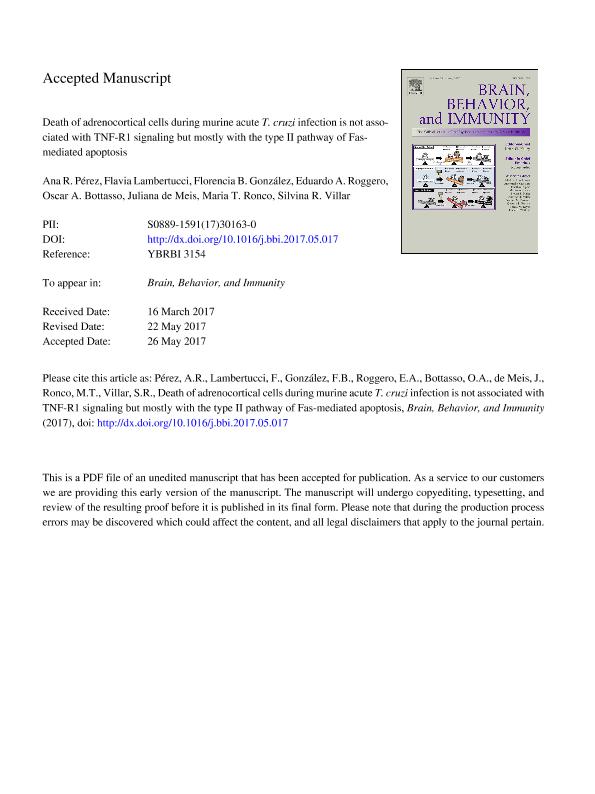Artículo
Death of adrenocortical cells during murine acute T. cruzi infection is not associated with TNF-R1 signaling but mostly with the type II pathway of Fas-mediated apoptosis
Perez, Ana Rosa ; Lambertucci, Flavia
; Lambertucci, Flavia ; González, Florencia Belén
; González, Florencia Belén ; Roggero, Eduardo Angel; Bottasso, Oscar Adelmo
; Roggero, Eduardo Angel; Bottasso, Oscar Adelmo ; de Meis, Juliana; Ronco, Maria Teresa
; de Meis, Juliana; Ronco, Maria Teresa ; Villar, Silvina Raquel
; Villar, Silvina Raquel
 ; Lambertucci, Flavia
; Lambertucci, Flavia ; González, Florencia Belén
; González, Florencia Belén ; Roggero, Eduardo Angel; Bottasso, Oscar Adelmo
; Roggero, Eduardo Angel; Bottasso, Oscar Adelmo ; de Meis, Juliana; Ronco, Maria Teresa
; de Meis, Juliana; Ronco, Maria Teresa ; Villar, Silvina Raquel
; Villar, Silvina Raquel
Fecha de publicación:
10/2017
Editorial:
Academic Press Inc Elsevier Science
Revista:
Brain Behavior And Immunity
ISSN:
0889-1591
Idioma:
Inglés
Tipo de recurso:
Artículo publicado
Clasificación temática:
Resumen
Earlier studies from our laboratory demonstrated that acute experimental Trypanosoma cruzi infection promotes an intense inflammation along with a sepsis-like dysregulated adrenal response characterized by normal levels of ACTH with raised glucocorticoid secretion. Inflammation was also known to result in adrenal cell apoptosis, which in turn may influence HPA axis uncoupling. To explore factors and pathways which may be involved in the apoptosis of adrenal cells, together with its impact on the functionality of the gland, we carried out a series of studies in mice lacking death receptors, such as TNF-R1 (C57BL/6-Tnfrsf1a tm1Imx or TNF-R1−/−) or Fas ligand (C57BL/6 Fas-deficient lpr mice), undergoing acute T. cruzi infection. Here we demonstrate that the late hypercorticosterolism seen in C57BL/6 mice during acute T. cruzi infection coexists with and hyperplasia and hypertrophy of zona fasciculata, paralleled by increased number of apoptotic cells. Apoptosis seems to be mediated mainly by the type II pathway of Fas-mediated apoptosis, which engages the mitochondrial pathway of apoptosis triggering the cytochrome c release to increase caspase-3 activation. Fas-induced apoptosis of adrenocortical cells is also related with an exacerbated production of intra-adrenal cytokines that probably maintain the late supply of adrenal hormones during host response. Present results shed light on the molecular mechanisms dealing with these phenomena which are crucial not only for the development of interventions attempting to avoid adrenal dysfunction, but also for its wide occurrence in other infectious-based critical illnesses.
Archivos asociados
Licencia
Identificadores
Colecciones
Articulos(IDICER)
Articulos de INSTITUTO DE INMUNOLOGIA CLINICA Y EXPERIMENTAL DE ROSARIO
Articulos de INSTITUTO DE INMUNOLOGIA CLINICA Y EXPERIMENTAL DE ROSARIO
Articulos(IFISE)
Articulos de INST.DE FISIOLOGIA EXPERIMENTAL (I)
Articulos de INST.DE FISIOLOGIA EXPERIMENTAL (I)
Citación
Perez, Ana Rosa; Lambertucci, Flavia; González, Florencia Belén; Roggero, Eduardo Angel; Bottasso, Oscar Adelmo; et al.; Death of adrenocortical cells during murine acute T. cruzi infection is not associated with TNF-R1 signaling but mostly with the type II pathway of Fas-mediated apoptosis; Academic Press Inc Elsevier Science; Brain Behavior And Immunity; 65; 10-2017; 284-295
Compartir
Altmétricas



